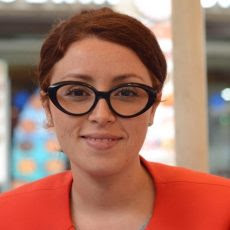Chilean around the world

"Old age is associated with leaking, that is undeniable, but this is not synonymous with dependence or disability. This has been my fight"

Agnieszka Bozanic Leal is a psychologist from the University of Chile, Masters in Psychogerontology at the University of Barcelona and is currently doing her PhD in medicine and translational research at the University of Barcelona.
In its first years of University, Agnieszka still wasn't clear where his professional career guide. His interest was always related to the biological topics. For this reason, in third year of Psychology took the elective Neuropsychology, which was the kick-off for your career path.
He developed his practice in el Salvador Hospital in Neuropsychology working unit of Alzheimer's and other degenerative diseases, where engaged was in conducting Neuropsychological assessments, complementary tests that support the clinical diagnosis of Alzheimer's disease. "I started to get involved in aging and I realized that that was what I liked the Neuropsychology", Bozanic says.
Little by little it was inserted in the area of aging and old age. He has taught classes and courses at different universities and hospitals, However, There is no specialization in the field, He decided to look for alternatives outside of Chile to continue his training.
Professional search
His professional concern focused on complementing the social approach with Geriatrics. Like this, on the recommendation of her husband, You searched for postgraduate courses that met its objectives, In addition to apply for Chile scholarships for master's degree abroad. In this way, found the masters in Psychogerontology at the University of Barcelona. "As the University of Barcelona is well ranked, I won the scholarship and I traveled with my husband and my dog", declares.
Even so, the Master did not satisfy it completely, "I considered it very introductory, It did not provide me many new things in the theoretical. But, I took the juice to the practices of six months in the unit of Alzheimer of the Institute of neuroscience of Hospital Clínico of Barcelona". In this context, returned to apply for scholarships Chile, This time to the PhD Scholarship, Thus research in topics of your interest and make teaching. He ran to the doctorate in medicine and translational research at the University of Barcelona, where currently develops a research on the relationship of dementia and diabetes. "Has it been discovered in Germany, China and England that there is a link between diabetes and dementia, Maybe people who are diabetic are more likely to develop dementia. For this reason, I proposed to my guardian analyze cognitive performance in people 70 to 75 years who suffer from diabetes. To contribute now to research in Chile, the exhibition will consist of 400 Chileans and 400 Catalan. "This because studies indicate that Hispanic populations are even more likely to introduce cognitive disorders due to diabetes", argues Bozanic.
To carry out the samples, We contacted known from Chile so that they support it in its research work: "I spoke with several researchers, but it was Dr. Pablo Toro, who opened the door of the ACCDIS (Advanced Center for research in chronic diseases) to work with them on the project Mauco, in Molina. Paul studied in Germany and had intentions of carrying out such studies in Chile", details.
On collaborative networks that develop professionals for the development of research, Bozanic is emphatic in pointing out that these "are the most important research. The idea is to keep in touch and continue to do things, even if it is long distance". It complements, In addition, that collaboration was key to the development of their projects, "I left girl in this research, wanting to do things, But if you have people in your way, You can't do all the things that you set".
Return to Chile
Agnieszka has his scholarship until the year 2021 and intends to return to Chile to initiate projects that will help the investigation of old age in the country. "Part of my interest to return to the country happens because disclosure of science in relation to aging and old age, to be known above all the impact that diabetes can have on the mental health of the elderly, what currently is made invisible", manifest.
For this reason, for his doctorate he sought investigative lines were consistent with the reality of the country, so this had significant impact in national territory, "I am not going to help older people if I do a thesis of a subject that, in Chile, is almost impossible to do", reflects.
Bozanic would like to settle in a city that is not Santiago, where lack of scientific development on the topic. "The idea is to go to the South to any university that 'managed' to investigate. Build something entertaining with a multidisciplinary team, people who are interested in research on aging and old age", details.
Agnieszka says that aging and old age for most is not subject, "it has become naturalized non-important. These days you can see a little more by the of the AFPs, but we know that much work on other issues missing: quality of life, abuse, Bless you, etc". Since his professional career, Bozanic deposited their efforts so that older persons are a relevant issue in society and that no stigmatization them is as a dependent population who can not fend for itself. "Now I am on a crusade, in a fight against the ageism that we see everywhere, from television to public policies. For this, create the hashtag #GeroActivismo, to make visible the elderly as active and affable entities, that you do the same things as you or I".
By Sabrina Quezada
